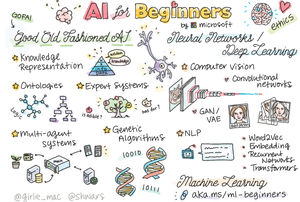| Microsoft's Artificial Intelligence for Beginners |
| Written by Nikos Vaggalis |
| Monday, 22 August 2022 |
|
There's a new free, self-paced, online course about Artificial Intelligence from Microsoft's Azure Cloud Advocates. Its 24 lesson curriculum, expected to take 12 weeks to complete, is targeted at those brand new to Artificial Intelligence. This is a continuation of last year's Microsoft's Machine Learning for Beginners.That course made a clear distinction between Machine Learning and AI - it was about "classic machine learning" and did not concern itself with artificial intelligence. That is the job of its sibling course, AI for Beginners.This separation of topics meant that ML for Beginners was not as complicated as AI for Beginners is, well at the novice level anyway. Both courses require Python. ML uses Sci-kit and with good reason : Python certainly is the most popular language of doing ML, mainly due to the number of relevant libraries available. scikit-learn is one of the top Machine Learning libraries alongside PyTorch, NumPy, SciPy, TensorFlow and Theano. Additionally, scikit-learn is one of the easiest to learn as such perfect for beginning one's ML journey. That doesn't mean that it lacks functionality though; it is perfectly capable of pulling off many ML tasks such as classification, clustering, pre-processing, regression, etc. AI on the other hand, uses what ML doesn't - that is it demonstrates Neural Networks and Deep Learning with TensorFlow and PyTorch. So at the higher level, the curriculum is comprised of:
That overview in detail translates to :
Like its ML predecessor, it is carefully planned and well structured. It includes quizzes, doodles, assignments, projects, group discussions and some executable Jupyter Notebooks, which are often specific to the framework (PyTorch or TensorFlow). And, in my opinion, it's quite complete and perfectly addressed to CS students as a side-dish to their classes or for those having touched the subject at college and are looking to expand more under the scope of a Masters degree or of finding a job. Microsoft with its three part series, Data Science, ML and Al, all for beginners, has managed to cover those closely interrelated fields, giving a holistic education to those interested. In the current job landscape these fields could be used in isolation or in combination. The three-part series has every case covered. And,of course here at I Programmer we have a keen interest in anything to do with Data/ML/AI as well as the topic of Ethics and as such we highlight many relevant educational resources. You'll find some of those at the end of this article. If until now you were finding it confusing as to how to get started in the science of AI, then confusion begone. AI for beginners is the perfect place to start from. More InformationMicrosoft's Artificial Intelligence for Beginners Related ArticlesMicrosoft's Data Science for Beginners Microsoft's Machine Learning for Beginners Fly Over the Moon With Microsoft And Python Introduction to Machine Learning with Scikit-Learn Yann LeCun’s Deep Learning Course Free From NYU Artificial Intelligence, Machine Learning and Society Take Stanford's Introduction to Robotics For Free Take Stanford's Natural Language Processing with Deep Learning For Free Ethics of AI - A Course From Finland Take Stanford's Natural Language Understanding For Free Take Google's Machine Learning Crash Course Program Deep Learning on the GPU with Triton
To be informed about new articles on I Programmer, sign up for our weekly newsletter, subscribe to the RSS feed and follow us on Twitter, Facebook or Linkedin.
Comments
or email your comment to: comments@i-programmer.info |
| Last Updated ( Monday, 22 August 2022 ) |


